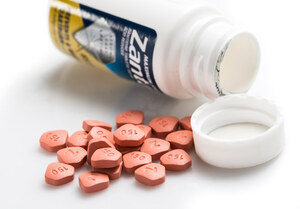LAWSUITS NEWS & LEGAL INFORMATION
Zantac Heartburn Medication Linked to Cancer
By Jane Mundy
Zantac (ranitidine hydrochloride) is being investigated after 150 Zantac tablets were found to contain a carcinogenic chemical up to 3,000 times greater than the FDA’s daily intake limit. The chemical found in the popular heartburn drug is N-nitrosodimethylamine (“NDMA”). Numerous studies have shown a link between the NDMA in Zantac and cancer. Evidence increasingly also indicates that Sanofi and Boehringer Ingelheim, the big pharma companies that make Zantac (ranitidine hydrochloride), concealed the Zantac cancer link.
 Two weeks before the above FDA announcement, U.S. and European regulators said they are reviewing the safety of ranitidine. Walmart said it is halting sales of Equate and Member's Mark brands of ranitidine. CVS suspended sales of Zantac and CVS Health store brand ranitidine on Sept. 28. (A suspension is not a recall: customers have not been told to stop using them; rather, they can return the medication at a later date for a refund.)
Two weeks before the above FDA announcement, U.S. and European regulators said they are reviewing the safety of ranitidine. Walmart said it is halting sales of Equate and Member's Mark brands of ranitidine. CVS suspended sales of Zantac and CVS Health store brand ranitidine on Sept. 28. (A suspension is not a recall: customers have not been told to stop using them; rather, they can return the medication at a later date for a refund.)
After learning of the FDA investigation, Apotex Corp. is recalling Ranitidine Tablets 75mg and 150mg at the retail level where it was distributed nationwide to Warehousing Chains. (Apotex, a Canadian pharmaceutical corporation, is the largest producer of generic drugs in Canada.)
The FDA on October 2 asked ranitidine makers to conduct their own testing to assess levels of the impurity and to send to the agency samples of their products for testing. The FDA will then assess oral ranitidine medicines and says it is currently testing samples of other heartburn treatments such as proton-pump inhibitors as part of the investigation.
“promulgate regulations requiring robust independent chemical testing and verification of medications. In the interim, while these regulations are pending, FDA should issue formal guidance recommending such testing and verification. This is necessary in order to serve public health and help protect Americans from adulterated and poor quality drug products, an issue of growing concern. Grounds for this request are also rooted in strong support from the medical community, as evidenced by a recent resolution from the American College of Cardiology (“ACC”), calling for the American Medical Association to advocate for legislation requiring independent testing and verification of the chemical content of batches of pharmaceuticals.”
The FDA checked the over-the-counter drug using a low-heat method of testing, and said it found much lower levels of the NDMA than was discovered with a higher temperature test used by Valisure. The agency further said that Valisure’s method, which Valisure had used for testing ARBs (some blood pressure medicines from a class of drugs known as angiotensin II receptor blockers), was not suitable for ranitidine.
“An analysis Valisure conducted in conditions similar to the human stomach generated over 300,000 nanograms of NDMA, significantly above acceptable levels set by the FDA, David Light, Valisure’s chief executive told Reuters, and this shows that even if the pills are not contaminated, the drug is likely to form the impurity in patients’ stomachs after it is ingested.
Valisure indicates that a copy of the Zantac recall petition has also been sent to the World Health Organization (WHO) and International Agency for Research on Cancer (IARC), as a nomination for ranitidine to be classified as a human carcinogen.
It is also used for acid reflux, gastroesophageal reflux disease (GERD), sour stomach, Barrett’s esophagus, gastric and duodenal ulcers, and other issues. Ranitidine Hydrochloride Tablet is an OTC oral product indicated for the relief of heartburn associated with acid indigestion and sour stomach brought on by eating or drinking certain foods and beverages.
NDMA is the same contaminant found recently in many brands of blood pressure and heart failure medicines, leading to recalls. For instance, European and American regulators recalled blood pressure drug valsartan made by China’s Zhejiang Huahai Pharmaceuticals after finding NDMA in samples of the drug.
Regulators have since found the carcinogenic impurities in a wide number of the drugs in the same class, called angiotensin II receptor blockers, or ARBs. The potentially cancer-causing impurities may have been introduced by recent changes in the manufacturing process for the drugs, and recalls of some ARBS led to shortages of the medications, including valsartan -- the generic of Novartis’ Diovan. Novartis in September stopped global distribution of its ranitidine drugs. And Canada has requested drugmakers to stop selling and distributing ranitidine.
Mounting evidence also allegedly shows that Sanofi and Boehringer Ingelheim, the big pharma companies that make Zantac (ranitidine hydrochloride), concealed the Zantac cancer link. This deception occurred when companies made unprecedented profits from Zantac, according to attorneys.
Valisure tested eight other popular alternatives to Zantac, including Tagamet, Pepcid, Prilosec, Nexium, Prevacid, Protonix, AcipHex and Dexilant. No detectable levels of NDMA were found in those medications.
Last updated on
FREE ZANTAC HEARTBURN MEDICATION LAWSUIT EVALUATION
Send your ZANTAC HEARTBURN MEDICATION claim to a lawyer who will review your claim at NO COST or obligation.
GET LEGAL HELP NOW
GET LEGAL HELP NOW
Zantac Suspension, Recall and the FDA
While the FDA has not gone so far as to recall the heartburn medication, it has found “unacceptable levels” of N-nitrosodimethylamine (NDMA) in samples of drugs containing ranitidine in its testing, according to Reuters (Oct 2, 2019). Two weeks before the above FDA announcement, U.S. and European regulators said they are reviewing the safety of ranitidine. Walmart said it is halting sales of Equate and Member's Mark brands of ranitidine. CVS suspended sales of Zantac and CVS Health store brand ranitidine on Sept. 28. (A suspension is not a recall: customers have not been told to stop using them; rather, they can return the medication at a later date for a refund.)
Two weeks before the above FDA announcement, U.S. and European regulators said they are reviewing the safety of ranitidine. Walmart said it is halting sales of Equate and Member's Mark brands of ranitidine. CVS suspended sales of Zantac and CVS Health store brand ranitidine on Sept. 28. (A suspension is not a recall: customers have not been told to stop using them; rather, they can return the medication at a later date for a refund.)After learning of the FDA investigation, Apotex Corp. is recalling Ranitidine Tablets 75mg and 150mg at the retail level where it was distributed nationwide to Warehousing Chains. (Apotex, a Canadian pharmaceutical corporation, is the largest producer of generic drugs in Canada.)
The FDA on October 2 asked ranitidine makers to conduct their own testing to assess levels of the impurity and to send to the agency samples of their products for testing. The FDA will then assess oral ranitidine medicines and says it is currently testing samples of other heartburn treatments such as proton-pump inhibitors as part of the investigation.
Zantac and Valisure
The agency is, however, investigating Zantac cancer risks after receiving the first alarm on September 9, 2019 from online pharmacy Valisure, which requested the FDA to recall and suspend sales of ranitidine from the US market. The FDA "has established a permissible daily intake limit for the probable human carcinogen, NDMA, of 96 ng. Valisure has detected NDMA in excess of 3,000,000 ng per tablet when analyzing ranitidine products, likely due to an inherent instability of the ranitidine molecule,” wrote Valisure Chief Scientific Officers. Valisure further requests in the letter that the FDA:“promulgate regulations requiring robust independent chemical testing and verification of medications. In the interim, while these regulations are pending, FDA should issue formal guidance recommending such testing and verification. This is necessary in order to serve public health and help protect Americans from adulterated and poor quality drug products, an issue of growing concern. Grounds for this request are also rooted in strong support from the medical community, as evidenced by a recent resolution from the American College of Cardiology (“ACC”), calling for the American Medical Association to advocate for legislation requiring independent testing and verification of the chemical content of batches of pharmaceuticals.”
The FDA checked the over-the-counter drug using a low-heat method of testing, and said it found much lower levels of the NDMA than was discovered with a higher temperature test used by Valisure. The agency further said that Valisure’s method, which Valisure had used for testing ARBs (some blood pressure medicines from a class of drugs known as angiotensin II receptor blockers), was not suitable for ranitidine.
“An analysis Valisure conducted in conditions similar to the human stomach generated over 300,000 nanograms of NDMA, significantly above acceptable levels set by the FDA, David Light, Valisure’s chief executive told Reuters, and this shows that even if the pills are not contaminated, the drug is likely to form the impurity in patients’ stomachs after it is ingested.
Valisure indicates that a copy of the Zantac recall petition has also been sent to the World Health Organization (WHO) and International Agency for Research on Cancer (IARC), as a nomination for ranitidine to be classified as a human carcinogen.
What is Zantac ?
Zantac (ranitidine hydrochloride) is an over-the-counter (OTC) medication that has been used for decades by millions of people worldwide to help treat heartburn. The FDA approved Glaxo Holdings in 1983 to market Zanatac as a short-term treatment of a common form of ulcers. By 1988 it became the world’s best selling drug, topping $1 billion in annual sales. By 1997 Glaxo’s patent for ranitidine expired in the U.S. and generic alternatives were launched. Sanofi SA currently sells Zantac in the U.S.It is also used for acid reflux, gastroesophageal reflux disease (GERD), sour stomach, Barrett’s esophagus, gastric and duodenal ulcers, and other issues. Ranitidine Hydrochloride Tablet is an OTC oral product indicated for the relief of heartburn associated with acid indigestion and sour stomach brought on by eating or drinking certain foods and beverages.
What is NDMA?
The carcinogenic chemical present in Zantac is known as N-nitrosodimethylamine (“NDMA”). It is produced as a by-product of several industrial processes and found at very low levels in certain foods, especially those cooked, smoked, or cured. NDMA is toxic to the liver and other organs and is a probable human carcinogen.NDMA is the same contaminant found recently in many brands of blood pressure and heart failure medicines, leading to recalls. For instance, European and American regulators recalled blood pressure drug valsartan made by China’s Zhejiang Huahai Pharmaceuticals after finding NDMA in samples of the drug.
Regulators have since found the carcinogenic impurities in a wide number of the drugs in the same class, called angiotensin II receptor blockers, or ARBs. The potentially cancer-causing impurities may have been introduced by recent changes in the manufacturing process for the drugs, and recalls of some ARBS led to shortages of the medications, including valsartan -- the generic of Novartis’ Diovan. Novartis in September stopped global distribution of its ranitidine drugs. And Canada has requested drugmakers to stop selling and distributing ranitidine.
Did Manufacturers Hide the Cancer Link?
The EPA considers NDMA a probable carcinogen, stating that animal studies have found that prolonged exposure led to tumors in the liver, lungs, and elsewhere. And a study published in Carcinogenisis (2016) show that people who take ranitidine have high levels of NDMA in their urine, suggesting that it is created in the body.Mounting evidence also allegedly shows that Sanofi and Boehringer Ingelheim, the big pharma companies that make Zantac (ranitidine hydrochloride), concealed the Zantac cancer link. This deception occurred when companies made unprecedented profits from Zantac, according to attorneys.
Zantac Lawsuits
Attorneys are now investigating Zantac cancer claims and a number of Zantac lawsuits are being filed against Sanofi and Boehringer Ingelheim for their reckless disregard for human health and putting profit over harm.Valisure tested eight other popular alternatives to Zantac, including Tagamet, Pepcid, Prilosec, Nexium, Prevacid, Protonix, AcipHex and Dexilant. No detectable levels of NDMA were found in those medications.
Zantac HeartBrun Medication Lawsuits Legal Help
If you or a loved one has suffered similar damages or injuries, please fill in our form and your complaint will be sent to a lawyer who may evaluate your claim at no cost or obligation.Last updated on
ZANTAC HEARTBURN MEDICATION LEGAL ARTICLES AND INTERVIEWS
Zantac Bellwether Trials Likely in 2023

Zantac Breast Cancer Lawsuit

What to Expect in Zantac Cancer Lawsuits for 2021 and Beyond


August 25, 2021
On June 14, the Southern District of Florida, where Zantac cancer lawsuits have been consolidated for pretrial motions, issued an amended case management schedule. The Order anticipates that bellwether trials will begin in 2023. READ MORE
Zantac Breast Cancer Lawsuit

May 20, 2021
On April 19, Marina Golden filed a Zantac cancer lawsuit in California state court, alleging that her years’ long use of Zantac caused her 2014 diagnosis of breast cancer. Her lawsuit seeks punitive and exemplary damages to punish the defendant manufacturers and retailers for their wrongful acts as well as compensatory damages in recognition of the harms that she suffered. READ MORE
What to Expect in Zantac Cancer Lawsuits for 2021 and Beyond

December 8, 2020
As 2020 draws to a close, the toll of death and injury from Zantac-related cancers continues to rise, as do the number of Zantac cancer lawsuits. Meanwhile, In Re: Zantac (Ranitidine) Products Liability Litigation, the multidistrict litigation into which many of the individual lawsuits have been consolidated, grinds on without much apparent news. READ MORE
READ MORE Drugs/Medical Settlements and Legal News
READ MORE Personal Injury Settlements and Legal News
READ MORE Personal Injury Settlements and Legal News

READER COMMENTS
cenforce soft 100mg
on
cenforce soft 100mg
on
Stephen c Carter
on
What law firms are taking law suits for Bladder Cancer victims on an individual basis due to years of taking Zantac.
I live in Phoenix, AZ.
I believe some alleged law firms advertising Zantac law suits is a scam just to get personal info.
Phillip miller
on
Otis S. Bonaparte,Jr
on
Jason
on
Candice Colby
on
kristy smith
on
Nadia oudeh
on
Take it. I have had nothing but stomach problems and circulation issues since but my doctor told me that I MIST keep taking the medication. What can I do
Billy G Davis
on
Catina L Sherman
on
giorgio stulov
on
can you let me know what my rights are -if i can be part of this lawsuit..
thank you kindly
George Stulov
Newmarket
Ontario
Canada
Matt Spence
on